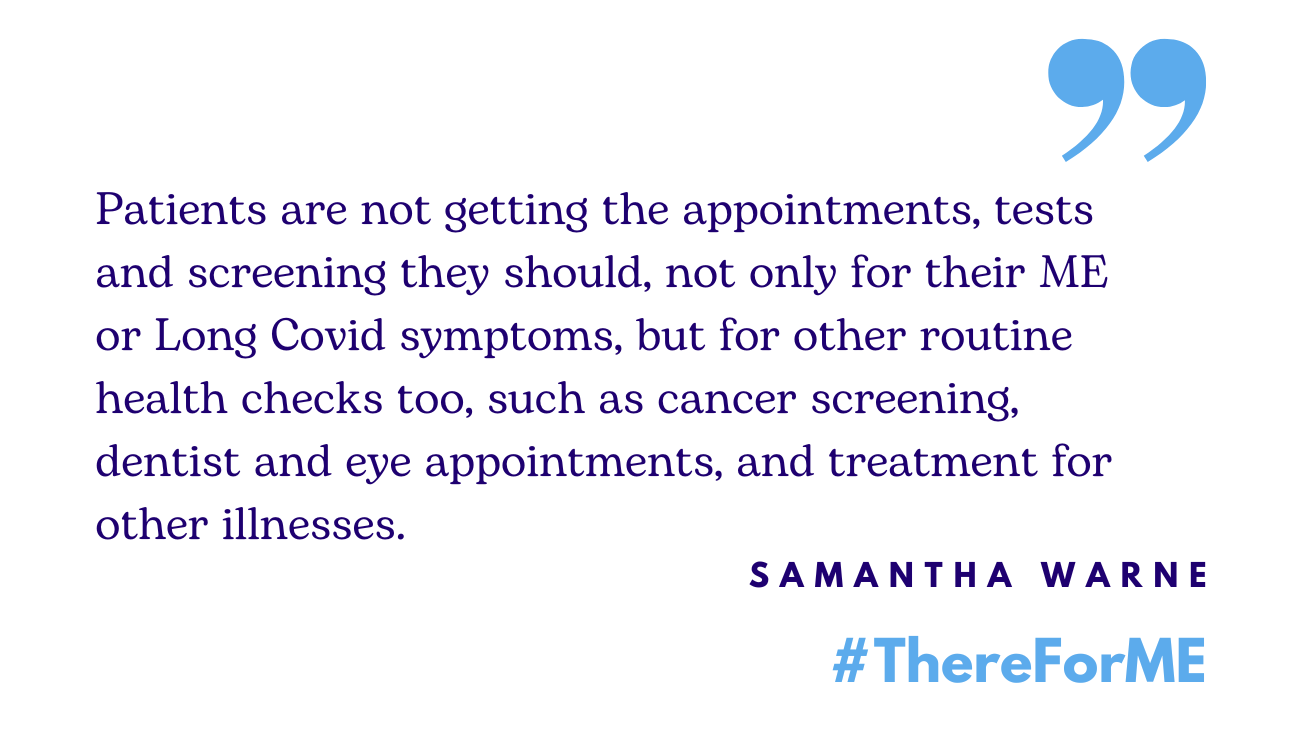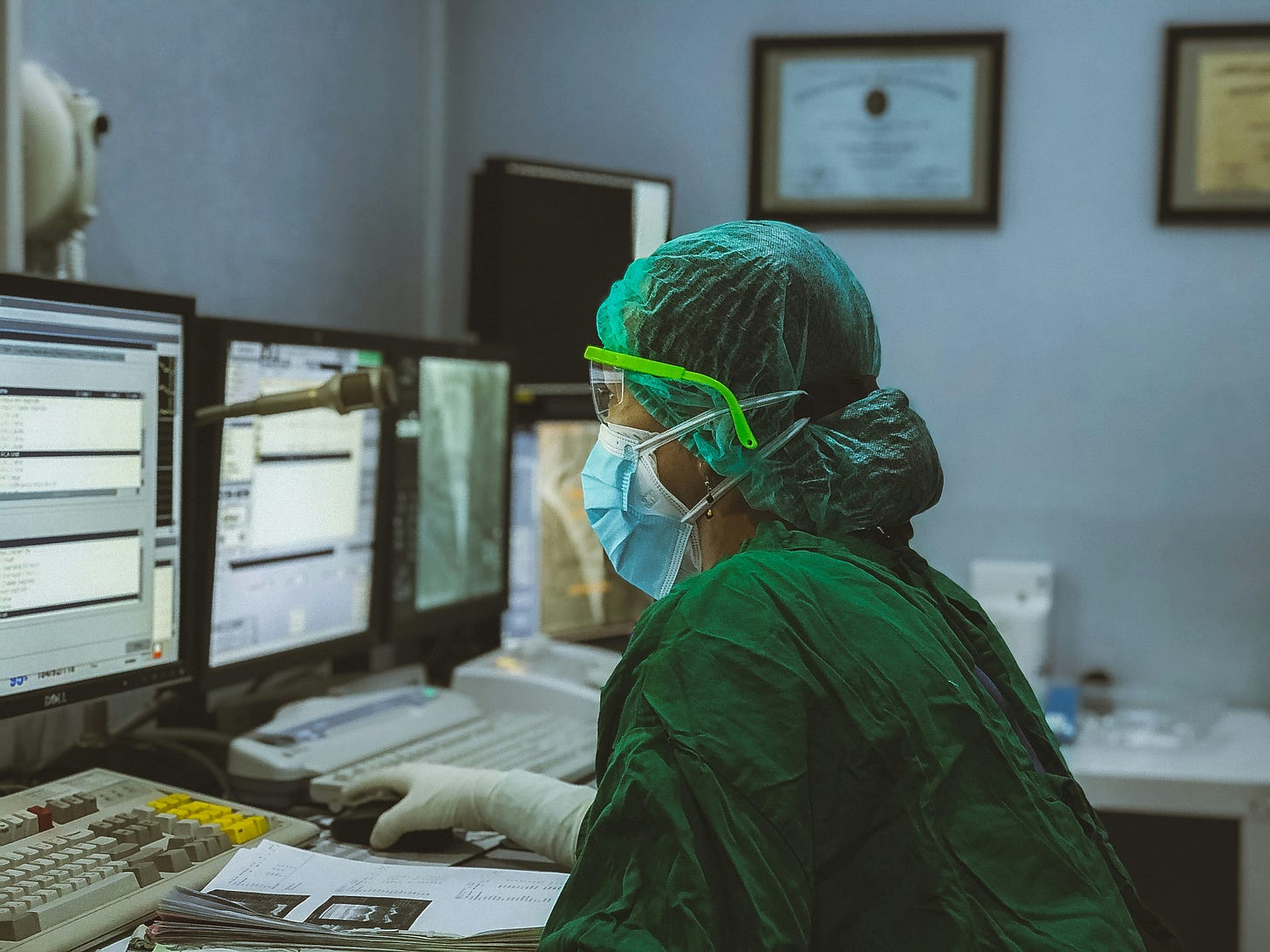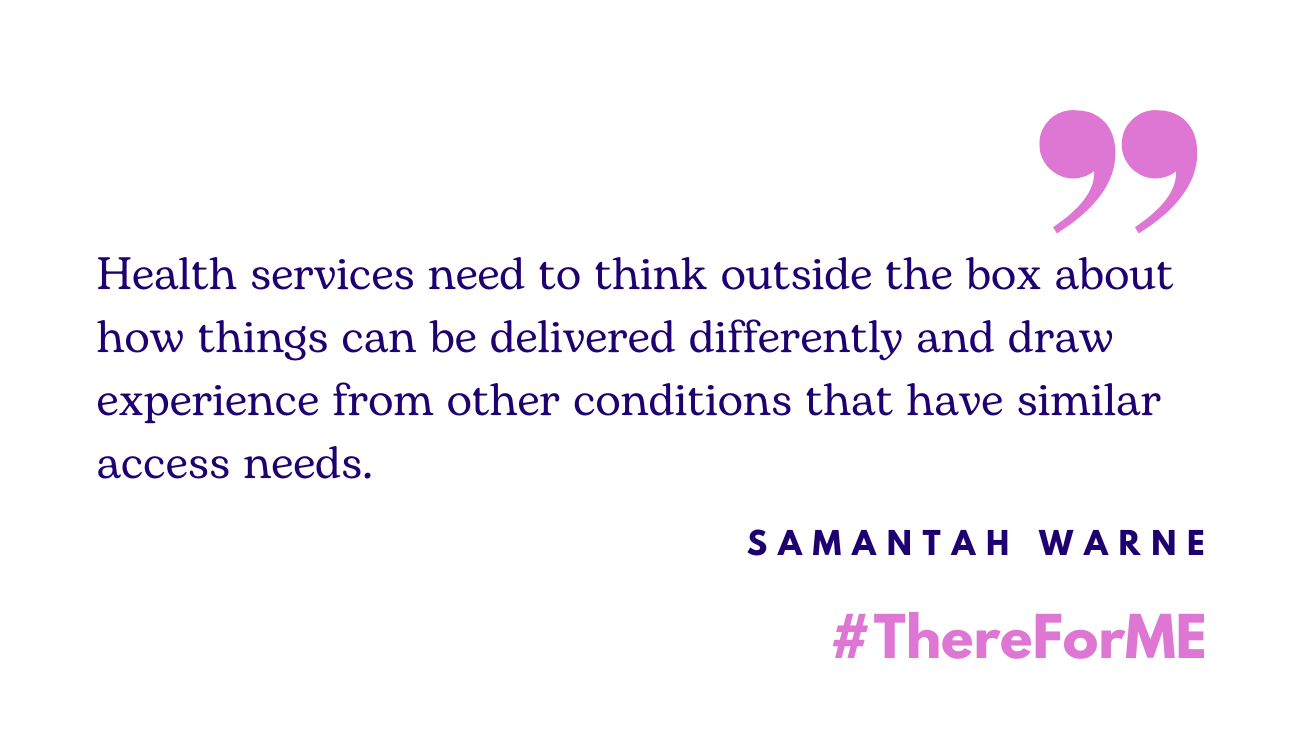Improving access to healthcare services for people with ME and Long Covid
Patients share their challenges, and the actions needed
Today’s guest post is from Samantha Warne. Samantha is the Lead Editor of Patient Safety Learning’s online platform for patient safety, the hub. Patient Safety Learning is a charity and independent voice for improving patient safety.
In a previous blog for the hub, #ThereForME explored the barriers that impact access to NHS care for people with ME and Long Covid and encouraged the patient community to share their experiences.
In this blog Samantha highlights the main themes that came out of those experiences, and the actions patients with ME and Long Covid feel could make a big difference to their care.
This post reproduces an original blog on the hub here.
For people with ME and Long Covid, accessing healthcare, whether for these or other conditions, can be challenging. It can be difficult to receive care without risking a deterioration in symptoms, especially when reasonable adjustments are not made to minimise the exertion involved.
Having read all the stories shared on the hub, there are common themes that stand out. I have grouped these themes below with examples. This is just a snapshot of the stories shared, and I encourage you read them all on our community thread.
Lack of energy to make and attend appointments
One of the challenges that strongly came through was the energy needed to navigate a complex and challenging health system, which patients with ME and Long Covid often simply don’t have.
A trip to the hospital or a GP can involve public transport, long walks from the bus stop to the clinic, waiting rooms that are crowded and noisy, often without enough chairs which may mean standing for extended periods. The temperature and lighting can also affect the patient. There are a range of issues that can potentially make a hospital or GP surgery difficult for someone with ME or Long Covid and they can become very exhausting environments.
“6 weeks post-covid, bedbound but able to do a few things, my GP sent an ambulance to take me to hospital for tests. I was left in a noisy corridor all day … All tests were done one after the other, with minimal rest in between.”

There is then the 'intense' conversations requiring cognition, often having to explain your condition multiple times to clinicians lacking a basic understanding of ME and core symptoms like post-exertional malaise (PEM). And then there are the tests that involve getting on and off beds and holding awkward positions.
“For a day patient procedure, I had to explain ME and what it meant to two nurses at the pre-op appointment, two nurses and a healthcare assistant at the hospital on admittance, and then even to the surgeon and anaesthetist. I could barely speak by the time the procedure took place.”
This can not only cause suffering at the time, but also in some cases shared with us continued to impact the patient after.
“Our hospital is a 3 hour round trip, so the energy required to attend is huge with days or weeks of payback.”
Trying to make an appointment at a suitable time can also be a challenge. As a result of the well documented existing pressures facing the health service, patients can often find it difficult to book healthcare appointments. These challenges can be exacerbated due to constraints of the 9–5 system. People have shared with us that in some cases this can be impossible.
“I cannot do morning appointments as I need the option to lie in if I have a bad night’s sleep.”
It’s also extremely difficult to plan an appointment as the patient doesn’t know how they will be feeling on the day, and, as many highlighted, there appears to be little understanding about ME and Long Covid. There is a lack of flexibility in appointment timing or understanding that a patient might need to delay their care to ensure sufficient space to recover between appointments. Patients may also face added stress due to being disbelieved or feeling that the disabling impact of their condition is dismissed during medical encounters, adding another drain on their scarce energy.
“We have to assess if the use of very limited energy is worth it. Interactions with an NHS system that is uneducated in ME can be extremely stressful, upsetting, creating a deterioration in health and even be harmful.”
Reasonable adjustments not being made
Many people who shared their stories on the hub highlighted the lack of reasonable adjustments made for them, particularly the unavailability of home visits, which as outlined above, would help reduce the energy spent on attending appointments at the hospital or GP surgery. However, sadly these adjustments are usually not made:
“It took years of advocating to access blood tests at home as my GP surgery repeatedly denied that I was housebound. I paid a private nurse to take my bloods instead.”
This is a patient safety concern as often patients are not getting the appointments, tests and screening they should, not only for their ME or Long Covid symptoms, but for other routine health checks too, such as cancer screening, dentist and eye appointments, and treatment for other illnesses. Below are just some of the many experiences shared with us:
“I have had zero health care of any sort since I became housebound in 2018 following cancer treatment. I have had no follow up mammograms since then (should be yearly). I spoke to the national screening service (Scotland) to try to address this as I've had breast cancer twice now; the conclusion was that if I needed any treatment as I couldn't access the hospital they could do nothing-–at no point was any attempt made to help me access the hospital.”
“I am supposed to attend an eye clinic every year to be monitored for glaucoma. When I explained I wasn't well enough to attend they removed me from their list of people to monitor. I feel I've completely lost access to health and dental care.”
“My smear test is 4 years overdue and I have not been able to access it because I am housebound and my GP surgery will not offer a home visit for it.”
A&E departments are especially poorly equipped to deal with ME patients:
“I was unfortunate to have to visit A&E 10 days post knee replacement with a possible DVT. There were no allowances made at all for my ME and even at times for my recent knee replacement. Bright lights, walking long distances on crutches, 10 hour wait on first visit and 6 hour waits on two subsequent visits to SDEC (same day emergency care), being forced to ask for a seat to sit on, nothing to put my leg up on, nobody to get me a drink when the trolley came until another patient relative saw my predicament … I didn’t feel safe and I didn’t feel cared for.”
Lack of infection control measures
Many patients said that they did not feel safe going into their GP surgery or hospital due to the lack of infection control measures in place, with staff rarely wearing face masks and poor ventilation in the buildings.
“Healthcare settings are so dangerous for us while airborne infections are not mitigated against.”
They expressed that this can be terrifying for people with Long Covid and ME as one infection could cause serious problems.
“I also hate going to the GP, nobody wears masks and there are always at least 2 or 3 people visibly coughing which makes me very anxious as any cold or flu will cause me to crash for weeks.”
When patients do ask for basic safety measures to be put in place, they are often dismissed.
“My mammogram mobile unit nurses refused to wear masks saying it was no longer required when I attended for a cancer screening.”
This lack of infection control was echoed in a recent blog Laura Evans wrote about how she has been dismissed when asking for basic patient safety measures to be put in place when going for an appointment.
A lack of knowledge from healthcare professionals
The uncertainty about the response of healthcare professionals to an ME or Long Covid diagnosis adds yet another layer of difficulty. Ignorance, and being belittled and dismissed, was commonly reported by patients sharing their experiences with us.
“I have had virtually no support from the NHS, as I quickly grew intolerant of being told ‘you'll recover in time’ when it seemed highly unlikely and even ‘M.E. doesn't exist’ by one GP.”
“I have been greeted with comments about my weight and immobility, including one GP who even told me which streets to walk down in order to achieve a one mile exercise circuit to do daily for weight loss. With further information on how this would be increased weekly to achieve 3 miles.”
There is often a lack of understanding of how other conditions interact with ME, or that many patients with ME are highly sensitive to medications, anaesthetics and other forms of intervention (tracer dyes, MRI/CT scans). Many patients have expressed concerns that there was a lack of specialist training at every single level.
Other health inequalities faced
The hub community thread also raised concerns around the intersectional barriers some people with Long Covid or ME face because of their race or ethnic background or because they are neurodiverse and that there is a lack of support for them.
“I'm a person of colour who has had Long Covid for nearly five years. I am dismayed at the total absence of Long Covid care or support for people of colour.”
“ME has so many implications across so many interconnected factors and people of colour are known to be less well treated already in the health system including for pain and fatigue, and also to be at high risk in population terms for ME and Long Covid.”
Equality and diversity need to be considered to prevent inequalities widening.
What needs to be done to improve services?
Health services need to think outside the box about how things can be delivered differently and draw experience from other conditions that have similar access needs, for example, autism, learning disabilities, sensory sensitivities.
There were lots of suggestions from patients and carers on how services could be improved. Here are the 10 that stood out:
More home visits, for example for dentistry, blood tests, physio, eye tests, smear tests and consultations, scheduled at a time that works for the patient.
More remote appointments.
Longer appointments.
The ability to submit written information in advance to minimise talking time and shorten appointments.
Basic infection control measures in place, such as staff wearing high quality masks and appropriate ventilation in the building.
Better designed GP surgeries and hospitals—for example, waiting areas available that are quiet and dimly lit and thought given to how people will get to the different departments they may need to attend.
Joined up thinking and communication between departments treating co-morbid conditions—for example, endocrinology, neurology, rheumatology, gastroenterology, allergy clinic, etc.
Appropriate in-patient care for severe patients when hospital admission cannot be avoided, in a supportive caring environment, utilising evidence-based support and designed for those with heightened sensitivities.
An advocacy service, where someone with extensive experience of ME can accompany and act as spokesperson to negotiate and navigate existing systems with the patient who is unable to advocate on their own behalf.
All staff throughout the NHS to have sufficient training on Long Covid and ME (including receptionists, as well as primary and secondary healthcare professionals).
Unfortunately, there were many negative experiences and challenges shared; however, there were some positive examples of reasonable adjustments that can make a big difference to the patient. I’ll leave you with two:
“We are very lucky to have a GP who is understanding. Because we are cautious about waiting in a busy GP reception area which is full of unwell people, we wait in the car outside and she calls us when she is ready. On our request she wears a mask and opens the windows for some ventilation. She also keeps the session as short as possible and arranges an appointment later in the day.”
“I had a specialist-trained ME doctor when I first developed ME, who, although she could not provide me with any of the additional services that ME patients so clearly need, was able competently to diagnose me, to reassure me in relation to differential diagnoses, to refer me to the local ME service (which visited me at home and did much to teach me about pacing and help stabilise me in the early months of illness), and who was unfailing in her patience and care for those with chronic conditions like ME, often exceeding appointment time limits and going out of her way to phone with reminders for blood tests or check ups or to follow something up, suggest non-NHS alternative practitioners or simply discuss my fears and concerns, particularly when new symptoms arose.”
We would love to hear from healthcare professionals who are making changes in their organisations. Please share your initiatives and examples of good practice with the hub on the original post here.







Despite the systemic problems, it's encouraging to see that more informed, compassionate health care is possible. If the few individuals given as examples can do this, then so can others. Basic training in the limitations of those with ME/LC for everyone working in health care settings would already make a difference to patients' experiences.
This is so important! So many people with ME don’t access any care at all, until a problem becomes critical, because of all the issues described in this article.
When #pwME haven’t had the energy to wash or dress regularly for years, no-one understands their condition, blood tests don’t discover what is wrong & there is no treatment - it’s not surprising they avoid healthcare.
Unfortunately, this perpetuates the lack of awareness.
Thanks to #ThereforME and their supporters this is slowly beginning to change 🙏💙🫂